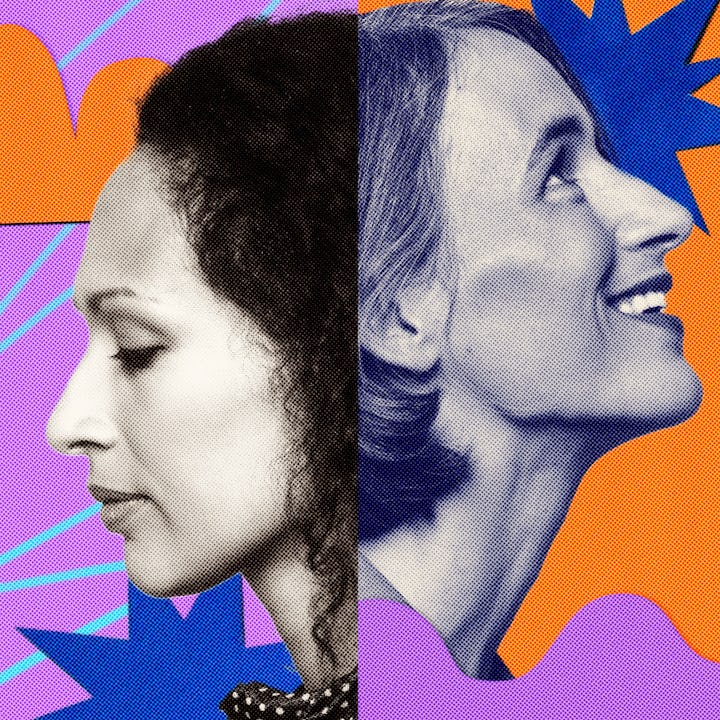I Didn’t Speak Up In My First Marriage, But Now I Know Better
I finally learned that not communicating isn’t noble. It’s harmful. And once I saw that, I couldn’t unsee it.

I didn’t speak up in my first marriage because I didn’t think I was supposed to.
There. I said it.
And I don’t think my story is all that rare, actually. I think a lot of women, especially those raised to be the good girl, the rule-follower, the people-pleaser, have lived this same script. I had a brain that constantly whispered, “Follow the rules. Be grateful. Don’t rock the boat. Don’t ask for more.”
And God forbid I say what I actually needed. Nope. That would be… ungrateful. Abrasive. Not “gentle.”
So instead of saying “I need A,” I’d pitch a vague idea. A little emotional breadcrumb. Like, “It’d be nice if…” and hope he'd picked up on it. Spoiler alert: he didn’t.
I grew up in a house where “Yes sir” and “Yes ma’am” weren’t just polite, they were obedience checks. Where the wife didn’t just defer to the husband, she needed permission. Where silence wasn’t just golden, it was expected. I was very good at following rules. Unless, of course, the rule involved high-functioning executive skills because — hello, I’m autistic. But if the rule was clear and relational? I was all in. I followed the script because to break the script was to feel the shame. And if there’s one thing I knew, it was how to avoid shame. Perfection is what was demanded in our home, so please, straight A’s for me, and a free dozen Krispy Kreme donuts for earning those suckers.
When I got married at 22, I played the part I had been taught: quiet wife, selfless wife, agreeable wife. I asked for permission instead of naming needs. I tiptoed instead of taking up space. I internalized every ache, every disappointment. I’d get physically sick and wonder why he didn’t care. But then I’d remember: he’s busy. PhD programs are hard. Tenure tracks are stressful. And he’s doing his best.
So I kept the peace. I convinced myself it would all get better if I just waited long enough. Prayed hard enough. Smiled kindly enough. Maybe if I got out of the house more. Maybe if I stayed quiet just a little longer. But peace without voice is not peace. It’s performance. And eventually, even I couldn’t keep up the act.
Modern day philosopher and social media influencer, Daniel Chidiac says empaths go through two phases: naive innocence and awakened strength. Well… I woke up. I woke up when a mentor told me this wasn’t normal. I woke up when my parents looked at me and said, “Where’s Meg?” I woke up when I realized my kids were watching, and I wanted them to know a mom who used her voice. Not one who disappeared for the sake of someone else’s comfort.
And that awakening? It changed me. I learned that not communicating isn’t noble. It’s not holy. It’s not humble. It’s harmful. It erases you. And once I saw that, I couldn’t unsee it.
Now I have entered a second marriage that is world’s away from what my first one was. Not because my husband “lets” me speak up — but because I choose to and do. Because now I know: protecting my peace means protecting my voice. And this time, I brought Meg with me. All of her.
Now, if you ask my husband — who is as gracious and steady as they come — he’ll tell you: I typically name what I need. He doesn’t have to read my mind. I don’t make him guess. And that’s not only loving to myself, it’s loving to him. Our home doesn’t run on silence and suppression—it runs on clarity and connection.
And yeah, sometimes I overshoot the landing. I name too much. But you know what? I’d rather be too much than not myself. In this marriage, I say things like:
“I need more time with you.”
“I’m overstimulated and need to be alone for a bit.”
“That comment hurt — can we talk about it?”
“I need you to come find me and hug me like you mean it.”
Because I know now — peace is not the absence of conflict. It’s the presence of truth and gateway to intimacy. I had spent too many years thinking love meant losing myself. But the right love? It invites all of you to stay. Even the messy, outspoken, strong, wildly wonderful parts.
So here I am.
Speaking up.
Because I’m supposed to.
Meg Raby is a mom, children's author of the My Brother Otto series, and Autistic residing in Salt Lake City where you can find her playing and working with neurodivergent children as a Speech Language Pathologist and friend, or writing and planning big things in the second booth at her local coffee shop that overlooks the Wasatch Mountains while sipping on her Americano. Meg believes the essence of life is to understand, love and welcome others (aka, to give a damn about humans).